My KPFA - A Historical Footnote
Imbedded in the arts
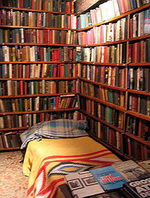
Shakespeare and Co, Paris
When the song of one’s self is coming all of a piece,
an attic room and chamber pot do not insult the soul.
Louis Hyde, The Gift
Those of us who pursued the arts of drama and literature under KPFA’s umbrella will remember the extraordinary contrast with virtually every other media outlet. We certainly weren't paid at commercial rates, but there was never anyone behind the scenes suggesting that an idea wasn’t “saleable”, that an advertiser might take offense at an imagined slight to his product, or that a reader might see red at a particular word or sentiment. We accellerated blithely up the literary high road, unconcerned that our scarves might someday get caught in the wheels.
Here are a few of the happy results. These eight listings have their own separate pages.
Berkeley Poetry Conference 1955
The Festival of American Arts and Humanities, London, 1966
Bertrand Russell: What desires are politically important?
A Little Edith Wharton Ghost Story My dramatic production of Erik Bauserfeld's adaptation of Edith Wharton's Roman Fever is my only justification for including here this little fragment of ghostly reality.
KPFA in Middle English In 1963 Professior Paul Piehler of the UC Berkeley English Department came to us with a remarkable proposition. He had a couple of PhD candidates with acting experience, and group readings in his Middle English seminar had been so successful that he thought it might be worth putting on the air a dramatization of The Towneley Play of Noah. Having read Chaucer at Cal as an undergrad, I found the idea irresistible! The result was so successful that two years later we went on to an even more ambitious production of Sir Gawain and the Green Knight. Its broadcast was to become an annual Christmas tradition.
Political Correctness In 1977 I was in California when Erik Bauersfeld was under attack from the station’s new program director for presenting on the air readings of literature in which the narrator or the characters had spoken in words which were racist or sexist, i.e. true to life and therefor to art. In a phone-in, all the callers (including me) supported freedom. Back in 1966, my two Eric/ks had discussed the difference between art and propaganda.
"Where there is no choice there is no Art. " Herbert Brun
Narrated by Charles Levy
Written by Michael Roseman and Richard Vernier
Technical direction and production by Fred Haynes
A memorial program commemorating the twenty-fifth anniversary of the outbreak of the Spanish Civil War. Neither drama, documentary, nor poetry, this curious radio form combines elements of all three, the poetry drawn from the work of fiercely partisan poets such Frederico Garcia Lorca, Rafael Alberti, Miguel Hernandez, Manuel Altolaguirre, Pablo Nerudo, Emilio Prados, Nicolas Guillen, Cesar Vallejo, and others.
Recorded at KPFA, 19 July 1961; First KPFA broadcast, 21 July 1961
The Text of the booklet which accompanied the program is HERE
When James Baldwin talked on air with Elsa Knight Thompson and John Leonard in May 1963, The Fire Next Time, recently published by the New Yorker, had received very favourable attention. However his long-gestating second novel, Another Country, was much more challenging to contemporary mores and so met with mixed reviews. No wonder! The bisexual relationships of its principal characters were as hopelessly entangled, confused and agonized as those of their respective races. Not surprisingly, the novel was pronounced a failure by Time Magazine and aroused dismissive responses from Eldridge Cleaver and Norman Mailer.
But Baldwin was by now an established and well-regarded novelist and so he was able to respond confidently, even generously to his critics. Before and after the recorded conversation he talked with us about how inseperable from each other were America's crises of consumption and of conscience. His insightful characterization of America’s racial antagonism – not an isolated problem to be solved in itself, but a complex embodiment of the country’s economic and societal schizophrenia – is as timely today as it was half a century ago.
Allen Ginsberg is said to have written his most famous poem, Howl, in 1955 in my favorite Berkeley hangout, the coffee-shop-in-a-bookstore, Il Piccolo, later renamed the Cafe Mediterranean. The work was intended originally for performance, which it received on October 7th as part of the history-making reading at the Six Gallery in San Francisco. Shortly thereafter Ginsberg expanded it and added several more poems for publication by Lawrence Ferlinghetti’s press, City Lights.
As Lew Hill explains in his introduction to this brief excerpt [listen here], the KPFA recording was made and broadcast several months before Ferlinghetti’s arrest for publishing and selling an obscene book, which makes it one of the earliest (and most technically proficient). The subsequent trial involved several KPFA regulars, including Al Bendick as defense lawyer and Kenneth Rexroth as a defense witness. [Amusing footnote: Several years later, when Rexroth was identified by Time Magazine as the “Father of the Beats”, his response was, "An entomologist is not a bug."]
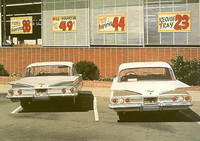 Another famous Ginsberg poem was “A Supermarket in California”,recorded at KPFA in 1955, a year before it was published [listen here]. This much studied and analyzed work was set in the starkly modernist all-night supermarket which was my grocery store of last resort, the U-Save [left] between University Avenue and Berkeley Way on the west side of Grove Street. (In the 60s, the latter was more long-windedly re-christened Martin Luther King Junior Boulevard, sometimes surreptitiously and sardonically shortened to Kingsway.) I may have encountered Allen as I was picking up a midnight pint of milk, but I was too prosaic (and too straight) to share his visions of Whitman and Lorca.
Another famous Ginsberg poem was “A Supermarket in California”,recorded at KPFA in 1955, a year before it was published [listen here]. This much studied and analyzed work was set in the starkly modernist all-night supermarket which was my grocery store of last resort, the U-Save [left] between University Avenue and Berkeley Way on the west side of Grove Street. (In the 60s, the latter was more long-windedly re-christened Martin Luther King Junior Boulevard, sometimes surreptitiously and sardonically shortened to Kingsway.) I may have encountered Allen as I was picking up a midnight pint of milk, but I was too prosaic (and too straight) to share his visions of Whitman and Lorca.
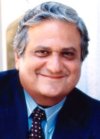
Michel de Ghelderode, Red Magic Act 1, Act 2, ACT 3 This grotesque play (written in 1931, the year I was born, an equally grotesque event ), was given a Breugelesque performance under the direction of KPFA's legendary director Virginia Maynard. (Alas, this was the only chance I had to work with her.) The leading role of Hieronymous the Miser was played with extraordinary bravura by an actor only 24 years old, named Michael Lerner [right]. The next year both he and I came to London, where we briefly courted a beautiful pair of sisters (his went on to a notable acting career). After two years at RADA, he went to Hollywood, where he has acted in over 140 films and gained an Academy Award nomination. We heard him first on KPFA!
A sad postscript: Virginia died on January 6, 2010. Her obituary appeared in the San Francisco Chronicle.
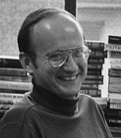 Nightsounds John Leonard, KPFA’s D&L Director in the early 60s, played around with freeform radio in a manner that echoed Henry Jacobs a decade earlier and would later inspire WBAI producers Bob Fass, Steve Post and Larry Josephson. I had lots of fun helping occasionally to produce it; this intriguing fragment is all I have left. (I'm told that he ordered all the masters to be destroyed.)
Nightsounds John Leonard, KPFA’s D&L Director in the early 60s, played around with freeform radio in a manner that echoed Henry Jacobs a decade earlier and would later inspire WBAI producers Bob Fass, Steve Post and Larry Josephson. I had lots of fun helping occasionally to produce it; this intriguing fragment is all I have left. (I'm told that he ordered all the masters to be destroyed.)
John went on to become the New York Times Book Review 's most distinguished editor and, in the opinion of Kurt Vonnegut, “the smartest man in the world”. In How a caged bird learns to sing he wrote about how his brain worked.
After a long and distinguished career which should have been even longer, he just made it in a wheelchair to vote for Barack Obama on November 4th, 2008; he died the next day. Google his name and you’ll find enough hagiographies to keep you reading well into the night.
Way Beyond the West In KPFA’s early days, Alan Watts was the voice most associated with the station in the popular imagination. Attracted in his youth both to Buddhism and Anglo-Catholicism, he had written his first book on Zen by the age of sixteen, but went on to become an ordained Anglican priest. In 1953, when he was teaching at the American Academy of Asian Studies in San Francisco, he was introduced to KPFA, probably by Bay Area poet Elsa Gidlow. Intermittently until his death twenty years later, his bi-weekly program Way Beyond the West alternated in a Sunday night sacred spot with the book reviews of Kenneth Rexroth.
with the station in the popular imagination. Attracted in his youth both to Buddhism and Anglo-Catholicism, he had written his first book on Zen by the age of sixteen, but went on to become an ordained Anglican priest. In 1953, when he was teaching at the American Academy of Asian Studies in San Francisco, he was introduced to KPFA, probably by Bay Area poet Elsa Gidlow. Intermittently until his death twenty years later, his bi-weekly program Way Beyond the West alternated in a Sunday night sacred spot with the book reviews of Kenneth Rexroth.
According to his good friend Henry Jacobs, Watts was able to get totally drunk, turn on his Webcor tape recorder (on loan from KPFA) and speak without notes but with total lucidity for half an hour, coming to a well-rounded, unrushed conclusion at exactly 28’30”. Countless hours of his lectures are available at this website. Here we have a brief three-minute excerpt dating from 1960.
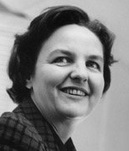
Jessica Mitford In 1960, a few days after the San Francisco police were giving anti-HUAC demonstrators swimming lessons on the City Hall steps, KPFA commentator Sidney Rogers was interviewing Decca Treuhaft [Jessica Mitford] about her autobiography, Hons and Rebels [American title: Daughters and Rebels]. [Listen here] Jessica was later famous for her noir masterpiece on the California funeral industry, The American Way of Death. This brief excerpt will give you a taste of two of the station’s most civilized conversationalists.
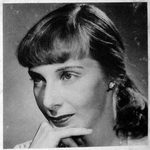
SHE’S GONE! . . . but not forgotten. ANNE SOULÉ, the Sweetheart of Sigmund Freud In 1952 I encountered and was overwhelmed by a dynamic young song satirist named Anne Soulé. At Robbie’s, Berkeley's all night coffee bar, she would hold us spellbound at the piano, singing, chatting, or merely scintillating.
Alan Rich, the Music Director at KPFA, booked her into their music studio to record an LP. It was subsequently broadcast, which gives me an excuse to include it here. Anne came long before the Internet and so this page may be her only memorial. Wherever you are, dear Anne, I doubt if you're resting in peace!
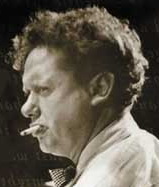
In 1953, Dylan Thomas gave a reading of his own and other poetry in Wheeler Hall on the UC Berkeley campus. I was sitting a few feet from him in the middle of the front row, hanging on his every word; at one point I picked up a book had dropped and handed it to him — moment of glory! Afterwards he autographed my copy of the New Directions collection. The signature was not a hasty scrawl, but was carefully formed — much neater than that which appears on the official website.
A high point of the evening was an impeccable impersonation of T.S. Eliot in Henry Reed’s devastating parody, “Chard Whitlow ”. He concluded with the poem that everyone had been waiting for, “Do not go gentle into that good night”. The entire delicious evening was broadcast on KPFA on May 7th.
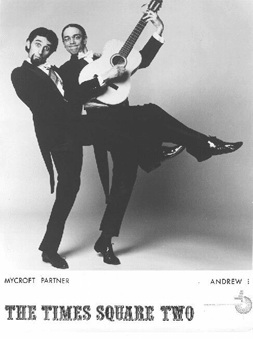
My Partner and I This bit of madness sat on my shelves unexplained and unidentified until years later, when a Google search brought up this excerpt from A Futile and Stupid Gesture: How Doug Kenney and National Lampoon Changed Comedy Forever, by Josh Karp:
In the late 1960s, Michel Choquette and English actor and musician Peter Elbling were partners in a strange act known as the Times Square Two. Under the stage names Mycroft Partner (Elbling) and Andrew I (Choquette)—thus, My Partner and I—attired in Edwardian dress, they performed an old-fashioned routine that was a throwback to the 1920s, with juggling, mind reading, and vaudeville conventions—a spoof of the slickness so pervasive among mainstream comics. After hooking up in 1964, they toured England, were a hit on the college circuit, and opened for Frank Zappa. By 1968, they were doing their act for Johnny Carson, the Smothers Brothers, and Dean Martin’s variety show. In 1969, the act had run its course and the pair went their separate ways.
Michel Choquette would later be one of the unbuttoned characters who gave us National Lampoon and its offshoots, Animal House and Caddyshack. Peter Elbling later joined The Committee, [see below].
GREEN CHRI$TMA$ KPFA was one of the few stations that broadcast Stan Freberg's diatribal masterpiece. "Bah humbug, everybody!"
Maurice Maeterlink, The Intruder with Ben Leger, Erik Bauersfeld, Bernard Mayes, Pat Franklin. Music by Peter Winkler and Douglas Leedy, directed by Jack Nessel, technical production by John Whiting. 28 Jun 64
Scenes from Moby Dick Sausalito Gate Theatre, technical production by John Whiting. 11 Jul 63
Bertold Brecht, The Trial of Lucullus KPFA Readers' Theatre, technical production by John Whiting. 18 Mar 63
Edith Wharton, Roman Fever with Pat Franklin and Shirley Medina, adapted and directed by Erik Bauersfeld, technical production by John Whiting. Sep 64
Robert Frost Commencement address, UC Berkeley Greek Theater, 1958
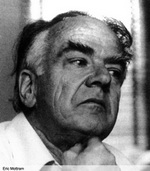
Eric Mottram [right], interviewed by Erik Bauersfeld October Sound Studio, London, 2 Nov 82
Eric Mottram poetry reading October Sound studio, London, 2 Nov 82
Muriel Rukeyser reading at Better Books, London, introduced by Eric Mottram. 18 Jan 72
The Committee An evening with the San Francisco repertory theatre company "whose forte is comic improvisions and set pieces". Narrated and produced by Jack Nessel, technical production by John Whiting. 1965
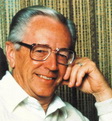
"Happiness is hearing an intellectual laugh!" Charles "Peanuts" Schulz [left] interviewed in his Marin County home study by Gail Rudwick and John Whiting, 30 Oct 62
Yankees Come Home John Whiting, Pacifica's London Correspondent, talks to five Americans who have settled temporarily or permanently in London. Produced for the BBC World Service. 15 Jun 66.
The Continuing Adventures of Larry Liberal And his Wife Bruce: One family alone against the forces of reaction KPFA’s on-the-air fund drives occasionally shifted from high fervor to high camp. Drama and LitDirector Jack Nessel came up with a series of mini soap operas centered around an archetypal young Berkeley couple. It elicited a mixed response.
The Hoffnung Montage Late one night when I'd finished putting together a serious documentary with a tight deadline, I was overcome with irreverence and spent the early morning producing a parody consisting of half a dozen musical laugh tracks that had been kicking around in my head. Its broadcast the following day elicited a number of phone calls, a small number of which were actually favorable.
Watson Was a Woman Or so mystery author Rex Stout suggested, tongue in cheek, at a Baker Street Irregulars meeting in 1941. The reception was less than enthusiastic, but after its publication in The Saturday Review of Literature, it was widely republished. When I wanted to program it in 1963, my high school friend Dean Dickensheet, who had become an eminent Sherlockian in his own right, encouraged me to record it myself. .